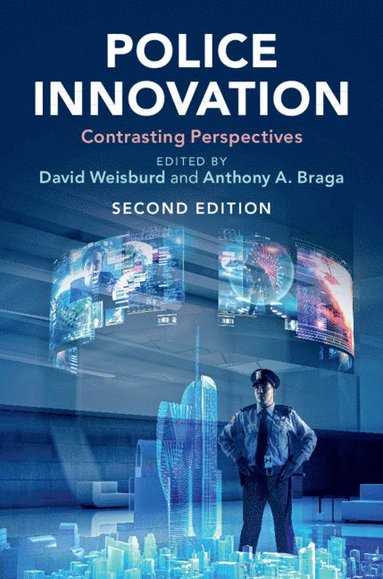
- Format
- Häftad (Paperback)
- Språk
- Engelska
- Antal sidor
- 582
- Utgivningsdatum
- 2019-08-29
- Upplaga
- 2
- Förlag
- Cambridge University Press
- Medarbetare
- Braga, Anthony A.
- Illustrationer
- Worked examples or Exercises; 6 Tables, black and white; 11 Line drawings, black and white
- Dimensioner
- 228 x 164 x 32 mm
- Vikt
- Antal komponenter
- 1
- Komponenter
- 2:B&W 6 x 9 in or 229 x 152 mm Perfect Bound on Creme w/Gloss Lam
- ISBN
- 9781108405911
- 817 g
Police Innovation
Contrasting Perspectives
- Skickas från oss på måndag
- Fri frakt över 249 kr för privatkunder i Sverige.
Passar bra ihop
De som köpt den här boken har ofta också köpt Who's Afraid of Gender? av Judith Butler (inbunden).
Köp båda 2 för 858 krKundrecensioner
Fler böcker av David Weisburd
-
The Criminology of White-Collar Crime
Sally S Simpson, David Weisburd
-
Handbook of Quantitative Criminology
Alex R Piquero, David Weisburd
-
Place Matters
David Weisburd
-
The Future of Evidence-Based Policing
David Weisburd
Övrig information
David Weisburd is Distinguished Professor of Criminology, Law and Society at George Mason University, Virginia and Walter E. Meyer Professor of Law and Criminal Justice at the Hebrew University of Jerusalem. He has received many international awards recognizing his work on policing and criminology more generally, including the Stockholm Prize in Criminology, the Edwin Sutherland and August Vollmer Awards from the American Society of Criminology, and the Israel Prize. Professor Weisburd served as Chair of the National Academies of Sciences Committee on Proactive Policing. Anthony A. Braga is a Distinguished Professor in and Director of the School of Criminology and Criminal Justice at Northeastern University, Boston. Between 2007 and 2013, Braga served as the Chief Policy Advisor to Commissioner Edward F. Davis of the Boston Police Department. His work with the Boston Police Department was recognized by the International Association of Chiefs of Police with its Excellence in Law Enforcement Research Award (2011).
Innehållsförteckning
Introduction: the context of police innovation David Weisburd and Anthony Braga; Part I. Community Policing: 1. Advocate: community policing Wesley Skogan; 2. Critic: community policing: a skeptical view Stephen Mastroski; Part II. Broken Windows Policing: 3. Advocate: of 'broken windows' criminology and criminal justice William Sousa and George Kelling; 4. Critic: incivilities reduction policing, zero tolerance, and the retreat from coproduction: even weaker foundations and stronger pressures Ralph Taylor; Part III. Procedural Justice Policing: 5. Advocate: procedural justice policing Tom Tyler and Tracey Meares; 6. Critic: the limits of procedural justice David Thacher; Part IV. Problem-Oriented Policing: 7. Advocate: why problem-oriented policing John Eck; 8. Critic: problem-oriented policing: the disconnect between principles and practice Anthony Braga and David Weisburd; Part V. Pulling Levers (Focused Deterrence) Policing: 9. Advocate: policing and the lessons of focused deterrence David M. Kennedy; 10. Critic: partnership, accountability, and innovation: clarifying Boston's experience with focused deterrence Anthony Braga; Part VI. Third-Party Policing: 11. Advocate: third-party policing Lorraine Green Mazerolle and Janet Ransley; 12. Critic: third-party policing: a critical view Tracey L. Meares; Part VII. Compstat: 13. Advocate: Compstat's innovation Eli Silverman; 14. Critic: changing everything so that everything can remain the same: Compstat and American policing David Weisburd, Stephen Mastrofski, James J. Willis and Rosanne Greenspan; Part VIII. Hot Spots Policing: 15. Advocate: hot spots policing as a model for police innovation Anthony Braga and David Weisburd; 16. Critic: the limits of hot spots policing Dennis Rosenbaum; Part IX. Predictive Policing: 17. Advocate: predictive policing Jerry Ratcliffe; 18. Critic predictive policing: where's the evidence Rachel Boba; Part X. Evidence-Based / Risk-Focused Policing: 19. Advocate: evidence-based policing for crime prevention Brandon Welsh; 20. Critic which evidence? What knowledge? Broadening information about the police and their interventions Jack Greene; Part XI. Technology Policing: 21. Advocate technology in policing Barak Ariel; 22. Critic: the limits of police technology Cynthia Lum and Chris Koper; Conclusion: police innovation and the future of policing David Weisburd and Anthony Braga.
Du kanske gillar
-
48 Laws of Power
R Greene
Häftad


